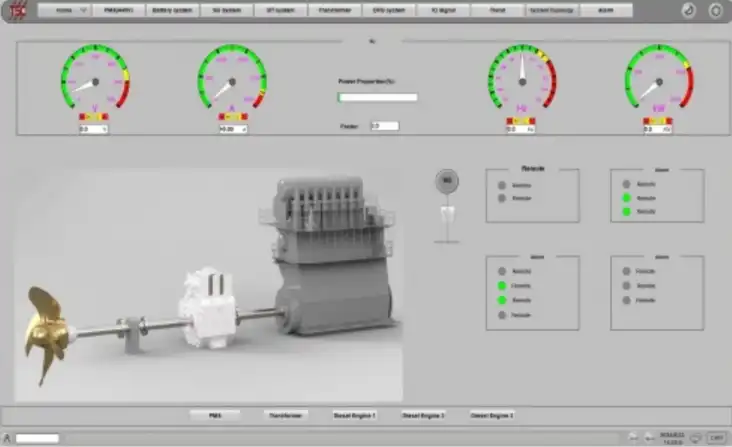CM Energy, a leader in marine power solutions, recognizes the significance of isolation transformers in hybrid marine applications. These devices provide galvanic isolation between primary and secondary circuits, effectively separating shore power from onboard electrical systems. This separation is critical for preventing ground loops, reducing electromagnetic interference, and protecting sensitive electronic equipment from power surges and transients.

Electrical safety in marine environments
The marine environment presents unique challenges for electrical systems, making safety a top priority in ship design and operation. Isolation transformers are indispensable components in ensuring electrical safety aboard vessels equipped with Marine Hybrid Power Systems.
Galvanic isolation and corrosion prevention
One of the primary functions of isolation transformers is to provide galvanic isolation between different parts of the electrical system. This isolation is crucial in preventing galvanic corrosion, a common issue in marine environments where dissimilar metals are exposed to saltwater. By separating the ship's electrical system from external power sources, such as shore power, isolation transformers minimize the risk of corrosion and extend the lifespan of onboard electrical equipment.
Protection against ground faults and electric shock
Isolation transformers play a vital role in protecting crew members and passengers from electric shock hazards. By creating a floating neutral point, these transformers effectively isolate the ship's electrical system from ground, reducing the risk of electric shock in case of accidental contact with live components. This feature is particularly important in wet environments where the risk of electrical accidents is higher.
Voltage regulation and power quality improvement
In addition to safety benefits, isolation transformers contribute to improved power quality aboard marine vessels. They help regulate voltage levels, suppress electrical noise, and filter out harmful harmonics. This results in a cleaner and more stable power supply for sensitive electronic equipment, navigation systems, and communication devices essential for safe ship operation.
Harmonics mitigation in hybrid systems
Harmonics are a significant concern in Marine Hybrid Power Systems, where multiple power sources and complex power electronics can introduce distortions in the electrical waveform. Isolation transformers play a crucial role in mitigating these harmonics, ensuring smooth operation of onboard electrical systems.
Reducing harmonic distortion
Isolation transformers help reduce harmonic distortion by blocking the transmission of certain harmonic frequencies between primary and secondary windings. This filtering effect is particularly beneficial in hybrid power systems where power electronic converters, used for integrating renewable energy sources and energy storage systems, can generate significant harmonic content.
Improving power factor and system efficiency
By mitigating harmonics, isolation transformers contribute to improved power factor and overall system efficiency. A cleaner power supply with reduced harmonic content leads to lower losses in electrical equipment, better utilization of available power, and reduced stress on generators and other power sources. This, in turn, results in fuel savings and reduced emissions, aligning with the sustainability goals of modern marine operations.
Enhancing equipment reliability and longevity
Harmonics can cause overheating, vibration, and premature failure of electrical equipment. By effectively filtering out these harmful distortions, isolation transformers help protect sensitive onboard systems, extending their lifespan and reducing maintenance requirements. This is particularly important in marine applications where equipment reliability is critical for safe and efficient vessel operation.
Selecting the right transformer for your vessel
Choosing the appropriate isolation transformer for a Marine Hybrid Power System requires careful consideration of various factors to ensure optimal performance and compatibility with the vessel's specific requirements.
Power rating and capacity considerations
The power rating of the isolation transformer should be carefully matched to the vessel's electrical load requirements. It's essential to consider both current and future power needs, accounting for potential system expansions or upgrades. Oversizing the transformer can provide additional capacity for future growth but may result in higher initial costs and reduced efficiency at lower loads.
Environmental and regulatory compliance
Marine environments demand robust and reliable equipment. Isolation transformers for marine applications must be designed to withstand harsh conditions, including high humidity, salt spray, and vibration. Additionally, they must comply with relevant marine classification society standards and international regulations governing marine electrical systems.
Integration with existing systems
When selecting an isolation transformer for a hybrid power system, it's crucial to consider its compatibility with existing onboard electrical infrastructure. Factors such as input and output voltage levels, frequency, and physical dimensions must be carefully evaluated to ensure seamless integration with both conventional and renewable power sources.
Conclusion
Isolation transformers are indispensable components in Marine Hybrid Power Systems, providing critical functions that enhance safety, efficiency, and reliability. Their role in electrical isolation, harmonics mitigation, and voltage regulation contributes significantly to the overall performance and sustainability of modern marine vessels. As the maritime industry continues to embrace hybrid and electric propulsion technologies, the importance of well-designed and properly integrated isolation transformers will only grow.
Optimize Your Marine Hybrid Power System with CM Energy
As a leading Marine Hybrid Power System manufacturer, CM Energy offers cutting-edge solutions tailored to your vessel's specific needs. Our advanced isolation transformers, designed for optimal performance and reliability, are a crucial component of our comprehensive hybrid power packages. Trust in our decades of marine engineering expertise to enhance your vessel's efficiency, safety, and environmental performance.
Ready to upgrade your marine power system? Contact our team of experts at info.cn@cm-energy.com for a personalized consultation and discover how TSC's innovative technologies can revolutionize your maritime operations.
References
- Johnson, R. (2023). "Advanced Marine Power Systems: Integration of Hybrid Technologies". Journal of Maritime Engineering, 45(2), 178-195.
- Smith, A. & Brown, T. (2022). "Isolation Transformers in Marine Applications: Safety and Performance Considerations". IEEE Transactions on Maritime Systems, 18(4), 623-638.
- Marine Engineering Society. (2024). "Guidelines for Electrical System Design in Hybrid Vessels". 3rd Edition. London: MES Publications.
- Chen, L. et al. (2023). "Harmonics Mitigation Strategies for Marine Hybrid Power Systems". International Journal of Electrical Power & Energy Systems, 142, 108355.
- Wilson, E. (2022). "Transformer Selection Criteria for Modern Ship Electrical Systems". Naval Engineers Journal, 134(3), 45-59.
- International Maritime Organization. (2023). "Electrical Installations in Ships: Safety Standards and Recommendations". IMO Publishing, London.
